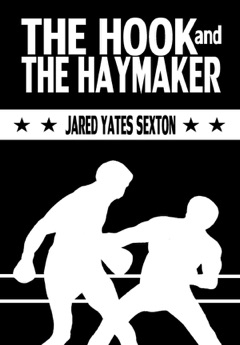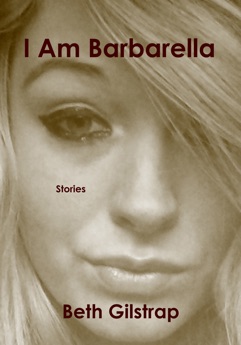






































Before getting to know Jared Yates Sexton and Beth Gilstrap, it seemed appropriate to publish their stories in the same month. And after getting to know them — and their work — a bit more, it not only seemed appropriate, it felt right. The characters in their stories — while different in many aspects — feel like they come from the same place, with the same set of values and the same music being played in the background. And then there’s the writers themselves — both accomplished and respected, both kick-ass editors, both friendly as heck, and smart as hell. So when it came time to do an interview, it only made sense to get Jared and Beth together. This is what happened.

LF: In both of your collections (I Am Barbarella and The Hook And The Haymaker, respectively), there is a real Southern voice running through many of the stories — even if it’s not addressed, it’s there, like an unseen character — is that something that just comes naturally? Do you think that that’s something unique to writers from the South?
BETH: I am haunted by the South in every way. I’ve spent much of my life at war with being born here. I always imagined myself moving somewhere else, but for a multitude of reasons, some small and some not so small, my partner Ben and I have remained here. I guess it comes naturally to me to write in this voice. To write anything else, I think would be inauthentic. The South and all its baggage is the quagmire inside my head. It is ugly and it is beautiful. I don’t believe this type of regional or place-based influence is unique to the South at all. Any place that gets in your bones, any place that haunts you, or is in your blood will affect character, voice, and story. Have you guys seen the new show Bloodline? It takes place in the Florida Keys and whew, talk about a unique place and voice. I guess I’m most drawn to settings that shape character, whether they’re Southern or not. Annie Proulx’s, Lauren Groff, Karen Russell, etc.
JARED: I’ve lived down south for the past three years and it’s already had a huge influence on my writing and philosophy. Originally, I’m from the Midwest, but Southern Indiana, which has more in common with the South than the rest of the Hoosier State, so it wasn’t so much a shock coming down here than a natural evolution. I have noticed though, there’s a difference in the people, in the culture, certainly, but a real trend toward oral storytelling and regional tradition that is both problematic and also exciting. More or less, this is an extension of what I learned up north, and the two have come together to form this kind of hybrid voice I’m toting around now.
LF: In addition to the voice, a lot of the stories (in each collection) are tied together through the subject of crumbling relationships — we’re often meeting characters after they’ve been left or have suffered some sort of loss — what is it about characters in these situations that draws you to them?
BETH: I am interested in transitional moments in characters’ lives. What happens when it all crumbles? Part of this is my naturally sunny disposition. Part of this is a way for me to process old wounds, part of this is continuing to explore my own issues with depression and anxiety, and part of this is what I like to read. I look for the answer to the question what will this character do when his/her footing is lost?
JARED: I’m with Beth — what I find most fascinating is when the routine of life gets disrupted. I like to take characters and see where their breaking points are, where they can stand their relationships and where they have to let them go. I think that’s the most telling thing about a person. Just how long they can stay.
LF: Beth, you’ve talked about before about music and the role it plays in your stories and in your writing — can you elaborate on that for us here. And Jared, how does music impact / influence your storytelling?
BETH: My older brother has been playing guitar since I was ten years old. My childhood and adolescence had a pretty incredible soundtrack. As he learned, he listened to everything he could get his hands on from Zeppelin to The Dead to Dinosaur Jr. and Curtis Mayfield. It was an education I didn’t even realize I was getting as I read and doodled and wrote in my notebooks. I cannot write without music. I use it in every phase of my process from generative writing exercises to drafting to revision and editing. To be specific, my story “After the Fire is Gone” wouldn’t exist without the Conway Twitty and Loretta Lynn duet. I started the story knowing I wanted to write about a secret Lucille kept from her lifelong friend, but until I happened upon that song, I didn’t know what it’d be. I wrote the first draft of that story in one day, which is rare for me.
JARED: Hot damn I love that song. I grew up in a house where my grandma was always playing the Conway/Loretta duets and they played a huge role in how I developed. I’ve always had old country on the mind, these songs about suffering and love gone sour. Rural blues, for sure. The influence was so much that, and I didn’t realize this until recently, it really affected who I became as a person. For several years there I was basically living like I wanted to exist inside an old hillbilly honky-tonk song, and those experiences, and the mindset, certainly, wound its way into my work.
BETH: Please tell me you had to watch Hee Haw on Saturday nights, too. It’s so strange because as a teenager and young adult, I gave my heart to alt rock, punk, and things more along that spectrum, but as I aged and started writing more, old country and the blues became more important to me. I don’t know. It’s such a strange combination. I came of age during grunge, but old country, gospel, and soul was what I heard most as a child. Add The Muppets to that weird mix and here I am.
LF: That’s an amazing collection of influences. And surprisingly similar to my own. My mom was a big Conway Twitty fan (though I don’t remember the music as much as the name) and gathering around the TV to watch both The Muppets and Hee Haw was a ritual. That all changed though as soon as I heard Cheap Trick.
BETH: I stand by a previous statement made at AWP. We are a stone cold pack of weirdos and I like it. My brother got into heavy metal early. Black Sabbath (I think) was the turning point for him. I think mine was Guns N’ Roses.
LF: Speaking of AWP, this past one is where I met you both for the first (and so far only) time. What’s your take on the conference — both being there as a writer and an editor and getting to do readings?
BETH: Like most introverts, I have conflicted feelings about AWP. This year felt a little different for me in a positive way. Maybe it’s the book or being part of Atticus Review now, but I felt like I was part of a community for the first time. I never know about readings. I saw some incredible readers like Jared this year. I think I’m getting better at them.
JARED: I used to hate AWP. I mean HATE it. I was miserable and it basically reflected back to me all the things I hated about myself. But something changed in the past couple of years. I’ve started to meet people I respect and like personally, so I’ve sort of found my tribe, so to speak, and that’s made all the difference in the world.
LF: I think that’s what is great about AWP now — it’s a chance to meet everyone you’ve been getting to know through Twitter. And it’s bringing a bunch of different online communities to life.
BETH: I totally agree. It’s pretty great (if I can manage to stay in the room long enough) to meet people and have them be as fabulous in real life as you hope they’d be.
JARED: It’s also one of those rare moments where, as a writer, you get the definite sense that you’re not alone in this thing.
LF: Also from AWP, Jared lamented that the story I saw him read (“Punch for Punch”) was a bit too much from real life — do you find that happens often with your work? And if so, how hard do you work to get around that?
JARED: I’d say ninety percent of my work is autobiographical. I’ve been a confessional writer for a long time, though the stories aren’t always completely based in truth there are influences and bits and pieces. The more experimental pieces are grown from the seed of that even if they don’t have much basis in reality. And I don’t want to exactly get past that completely. I think there’s something to personal writing, or inward-searching work, that comes through, whether you’re writing completely about yourself or otherwise.
BETH: It is rare for my fiction to have more than a dash of my real life in it. I channel real emotions into it, but there isn’t much beyond that. Okay, maybe I dated a few of my brother’s band mates, but I was 7 in 1984 so I didn’t hop in a van and leave my family. That would have been weird.
LF: How did your collections come together? Did you set out to write a collection with an idea of the types of stories / voice you wanted to have in it? Or did it come together after? For Beth — when did the idea of doing connected pieces come about?
BETH: Mine started as my thesis in graduate school. I knew I wanted the stories to be connected so my mentors developed a reading list heavy on these types of collections. The Dew Breaker by Edwidge Danticat, A Visit From the Goon Squad by Jennifer Egan, The Circus in Winter by Cathy Day, Winesburg, Ohio by Sherwood Anderson, etc. As far as types of stories or characters, I sat down to write my first story and Maddie and Janine showed up. Most of the connections come from Janine’s family. The stories that aren’t directly related through character are linked on more of a spiritual level.
LF: That’s a great reading list. I’d add Don Bajema’s two collections, Boy in the Air and Reach, to it as well. If you haven’t read them, I highly recommend checking them out. You can find both collections in one book now, called Winged Shoes and a Shield (City Lights).
JARED: I looked up one day, much like the first book, and realized I had a collection. Only it was twice as long. In An End To All Things, my first collection from Atticus, I blended minimalist pieces with experimental stories, and I liked that, but Dan Cafaro (editor of Atticus) suggested that for my next book I split them up. The Hook and The Haymaker became the minimalist collection and I Am The Oil of The Engine of The World (coming out from Split Lip next year) was the experimental one. The funny thing is, when I looked at Hook I started noticing a binding thread that was basically centered around these characters who were all coming to terms with finite possibilities.
LF: I think that’s why the stories in both of your collection read so well together — there are threads all throughout that tie everything together, whether it’s voice or character or theme.
LF: What’s the best part of having a book out? What’s the worse?
BETH: The best part is knowing that no matter what ever else happens in your life, you have put this thing in the world that wasn’t there before. The worst part for me is all the angst and self-doubt that has not magically disappeared. Go figure.
JARED: The best is actually finding a few new readers and having all this work, which is done in the abstract, actually palpable and holdable. The worst is the constant fear that comes with letting others read and critique your work. I’m constantly terrified every time a review comes out because I’m like, okay, here it is, the moment I’m exposed.
LF: You both work as editors as well. How do you find that balance? Have you found that editing made you a better writer? Did you set out to be an editor — was that something you always wanted to do?
BETH: I’m not sure I’ve found the balance yet. I’m still fairly new at this role and I’ve written much less since stepping into it. I feel such a responsibility to the authors we publish, it is difficult to juggle, and my work gets put on the back burner. I do believe editing has helped me hone my skills. When you are reading as many submissions as I am, you see what is working and not working on such a large scale, you’d have to be extremely stubborn not to learn from it. For instance, so many writers start with pages of backstory or simply aren’t writing in scenes. I think it’s also made me more of a risk-taker since the stories I tend to pick for publication have a bit of oddness to them. Tell me a story that’s different and crushes my heart. I guess that’s the kind of thing I try to write, too.
JARED: It took a long time to get the hang out of wearing those two hats. The responsibilities are completely different, though after some time I found that they were inextricably connected in terms of thought. It’s helped, a ton, in thinking about how my stories do what I want them to do, as well as seeing what everyone else out there is putting to paper.
LF: As editors, what do you think of the often talked about resurgence of the short story? Does it feel like it’s brought increased competition for stories? Is there any increased awareness for your publications? Are there more writers now? Better stories?
BETH: I don’t think the short story ever really went anywhere, but I do think there are more publishing opportunities than ever. It’s exciting and a little terrifying as both a writer and an editor, but this whole writer thing has always been wildly competitive and difficult.
JARED: Yeah, I think that was kind of a click-bait thing that people drag out of the mothballs every few months. It’s irritating, really. I think there’s a resurgence of lit simply because of the proliferation of MFA programs, which a lot of people roll their eyes at and criticize, but we’re at least keeping a community aloft and an entire antiquated art that most people think should’ve died out by now.
LF: I buy that. What I’d like to see are more writers and publishers unapologetically dedicated to short stories. They’re still largely seen as an entry point into a writing career — a stepping-stone to a novel — but I’d love to see a shift in the industry that makes it easier for people to get behind them.
BETH: I totally agree. I love that there are writers now doing just that. I met a lot of folks in grad school who had no intention of ever writing a novel. I love short stories and I will always write them, but I’m curious how I’d do with longer work. I’ve had a few novel attempts go unfinished. It’s more of a personal challenge to see what I come up with.
JARED: Inaccessible is also the accurate way to describe them. Whether it’s the fault of MFAs or specialized communities, there was a real move there for awhile toward these opaque, abstract pieces that anybody who didn’t have a degree or a bunch of coursework under their belts just couldn’t get into. And that was terribly detrimental.
LF: Who are your some of your biggest influences?
BETH: Carson McCullers, Flannery O’Connor, Lorrie Moore, Marilynne Robinson, William Faulkner, Toni Morrison, Alice Walker, Edwidge Danticat, Tennessee Williams, Sylvia Plath, Dorothy Allison, and Lauren Groff. Recently, I’ve become obsessed with Caitlin Moran and cartoonist Lynda Barry.
JARED: My guy is Carver, simply because I owe him a life’s worth of debt for showing me how to write a story. But after that, it’s Barry Hannah, Flannery O’Connor, Larry Brown, Vonnegut. Oh, and Richard Ford. He just gets better.
LF: What are you working on now?
BETH: I just finished three new stories. I am now about to get back into the first draft of my novel about Southern “folk” artists. It is such a big and complicated story that it terrifies me, but after working on it off and on for three years I’m still compelled to finish it, so finish it I must.
JARED: I’m finishing up this thriller book about an NSA analyst who uncovers a conspiracy in his work and, when that’s done, I’ve got a couple of other genre things I’m gonna try my hand at.
LF: Exciting stuff. Thanks so much to both of you for playing along.

Purchase THE HOOK AND THE HAYMAKER:
Powell’s | IndieBound | Barnes & Noble
Purchase I AM BARBARELLA:
Powell’s | Amazon | Barnes & Noble
Read Beth and Jared’s stories here at Little Fiction:
GIRLS LIKE THAT EAT LEMON POUND CAKE by Beth Gilstrap
KNIGHTS by Jared Yates Sexton

HOME | INTERVIEWS | STORIES


